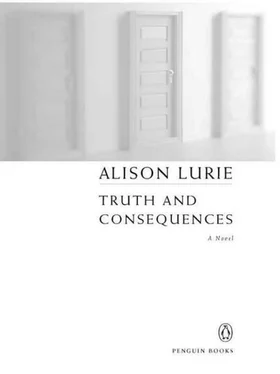“But we have to talk seriously.”
“Mh,” he agreed, though what he had to do now was get back to his drawing. The light beige he had chosen for the dressmaker’s dummy was wrong: it needed to be darker, or no, better, freckled with pinholes and stains.
“I just have to put these groceries away,” Jane said.
“Yeah, okay,” Alan said. Delia had been right again, he thought. Jane had come around. But why did she have to come around now, breaking into his work?
His wife closed the door of the fridge and sat on a kitchen stool. “We haven’t either of us behaved perfectly,” she said in the tone of someone trying to be more than fair.
“Uh, no,” Alan agreed. Delia wouldn’t think much of this admission, but the last thing he wanted now was a serious talk, and this might save time. He would add a section of the attic ceiling to the piece, he decided: the beams, the raw insulation and the nails coming through from the shingles. Yes, yes!
“But that isn’t what’s important. I mean, I don’t want to let something that only happened once, and I’m sure you regret now, destroy our marriage.” Jane unzipped her windbreaker and pulled it off. Underneath she had on a heavy, faded green cotton sweater from L. L. Bean that Delia would probably have died rather than wear.
“No,” Alan said weakly, realizing that he was admitting guilt, and also not telling the truth. It happened a lot more than once, it’s still happening, and I don’t regret it, he thought.
“So I decided we should just never mention it again.”
“Mh.” He frowned. You won’t mention it, he thought, and I won’t mention it, but we’ll both think of it, and I will be forever in the wrong.
“All I want is, I want you to promise not to see Delia again, ever.”
“But Jane, that’s not possible,” Alan exclaimed, stunned out of his preoccupation. “We’re both Fellows at the Center, after all.”
“I realize that. I know you’ll have to be in the same room sometimes, at the lectures and lunches. You’ll have to say hello and be polite if people are watching. But you don’t have to be alone with her.”
“Uh, no,” Alan said. I do have to be alone with her, he thought. She’s important to me. You don’t understand, and I don’t want you to understand. He looked at the conventionally pretty, badly dressed youngish woman who was sitting at the kitchen table. At the moment she seemed like a complete stranger.
For years he had felt love for this woman, and sometimes passionate desire, Alan remembered with surprise. He had been deeply grateful for her love and care in the worst moments of his illness: before, during, and after his operation. But slowly the duty of continuing to feel this gratitude had become oppressive. If Jane moved back, as she seemed determined to do, he would always have this duty. He might be more comfortable physically—meals would be better and the house cleaner—but he would always be one down. Also, it would be more difficult to see or speak to Delia.
“We have to make our marriage work. It’s our job, after all, the one we signed up for.”
“I guess so.” Alan was struck by the conventionality of her rhetoric, as if Jane were quoting the minister of her parents’ church, as was possibly the case. It occurred to him that something was lacking from this conversation. Jane had not said that she loved him or had missed him, and he had not said it either.
“We have to try, that’s all.” She did not look at him, but at the oiled butcher-block surface of the kitchen table, and her tone wavered, almost as if she were about to start crying. Moved by a combination of affection, pity, and good manners, Alan crossed the kitchen floor and awkwardly put his arm around her.
“Mm, hm,” he said. Over Jane’s shoulder he saw her suitcase slumped against the fridge by the back door. That could be a construction too, he thought. The fridge, the broom and dustpan hanging on the wall, the open door, the wheeled carry-on suitcase with its rectangular handle echoing the shape of the door. Someone is going, someone is coming. Everything in pale blue shades, only the suitcase dark, ink-black, like a hole in the scene. Or maybe everything else dark, and the suitcase ghostly white?
“Mom will be happy. She really wants you to be there for Thanksgiving.” For the first time Jane spoke in a somewhat normal voice.
“But I can’t do that,” Alan said, letting go of his wife and standing back.
Thanksgiving had never been one of his favorite holidays, and he had given no thought to its approach this year. Though he had once found domestic gratitude easy and natural, he had always resented being expected and forced to be grateful in a public manner. He had also never looked forward to holidays with Jane’s parents, who always, right from the beginning, had seemed to be judging him and finding him wanting. He wasn’t interested in local events, and didn’t feel or wish to show enthusiasm for televised sports. He did not like the food Jane’s mother made: the creamed overcooked vegetables, the heavy, oversugared pies and cakes. He detested the wine they served on special occasions, cheap sweetened brands called Blue Nun and Grenache Rosé. He did not want to go to church on Thanksgiving with Jane and her overextended family—new aunts, uncles, nieces, nephews, cousins, and in-laws were always turning up. Whenever he went he was bored, with a boredom that sometimes approached actual pain. But if he declined to go, waves of disapproval would wash over him, as they had last year, even though the ache in his back had prevented him from sitting in a pew or at the dinner table for more than ten minutes at a time.
And now it would be worse, because Jane always told her mother everything. Her parents and probably a lot of other relatives would have heard about what she had seen in Delia’s office. They would look at him and see a sinner, a lost sheep. Some would condemn him as an adulterer, while others, like the red-faced uncle who ran a construction company, would condemn him for being stupid enough to get caught. He would never be forgiven. So why should he give up anything?
“I have to go to New York,” he told Jane. It was hardly a lie, because he would make it true as soon as possible.
Jane gave him a disappointed look, which rapidly moderated into a suspicious one. “Delia Delaney is going to New York for Thanksgiving,” she said.
“So?”
“You’re going to see her there.”
“I hadn’t planned to.” Since Alan hadn’t planned to go to New York, this was strictly true, but might, he realized, soon become false. “I’m going to see my dealer,” he said, realizing that this too could become true. “He’s sold another picture, and there’s some new work I need to show him.” A surge of excitement at this idea caused him to smile at Jane, but she did not smile back. Instead, her expression was one of distrust and despondency.
“That’s nice,” she said without enthusiasm. “Well, I guess I’ll go unpack.” While Alan watched, unable to stop her, she pulled her carry-on suitcase across the kitchen floor and into the hall. Presently he could hear it bumping up the stairs, one step at a time, each bump the sound of boredom, duty, and depression to come.
SEVENTEEN
On the Tuesday after Thanksgiving, Jane Mackenzie stood in the upstairs hall of the Unger Center in a state of frustrated suspicion. The doors to Alan’s and Delia’s offices were both shut, and from behind the latter she seemed to hear shuffling and mumbling. Alan was in there, she was almost sure of it—anyhow, he wasn’t answering his phone, and neither was Delia. But she couldn’t know for sure, even if she had the nerve to use her master key again. Yesterday, while Jane was at lunch, Delia had gotten Susie to send for a locksmith to install a bolt on the inside of her door.
Читать дальше







![Кэмерон Доки - Правда и ее последствия[Truth and Consequences]](/books/79610/kemeron-doki-pravda-i-ee-posledstviya-truth-and-con-thumb.webp)




